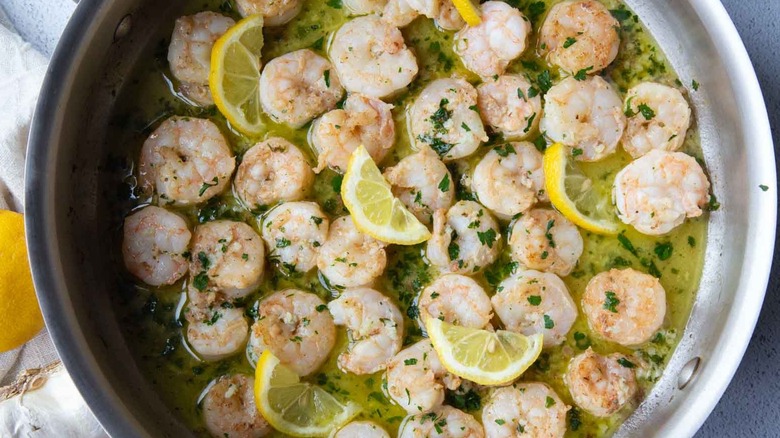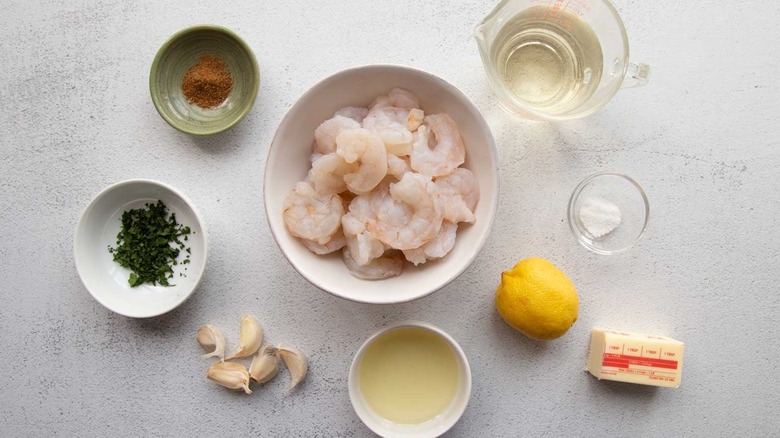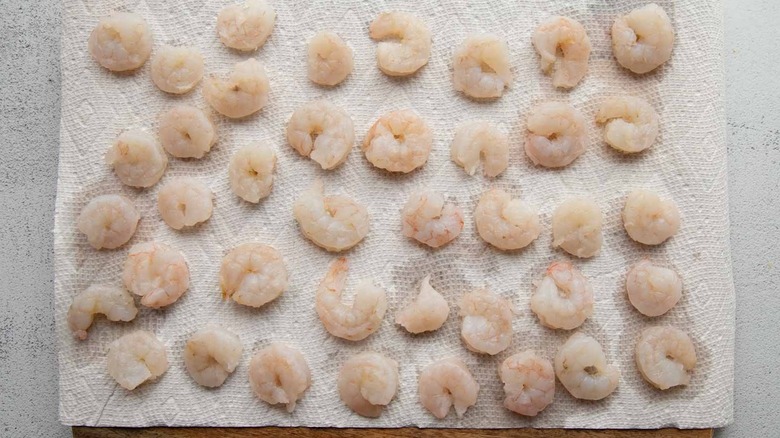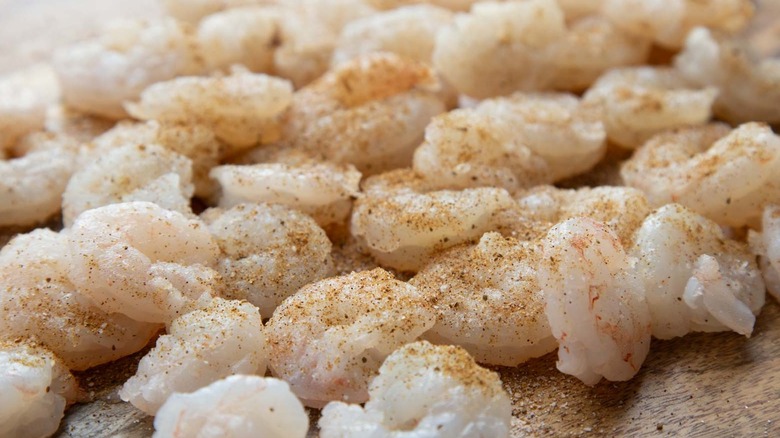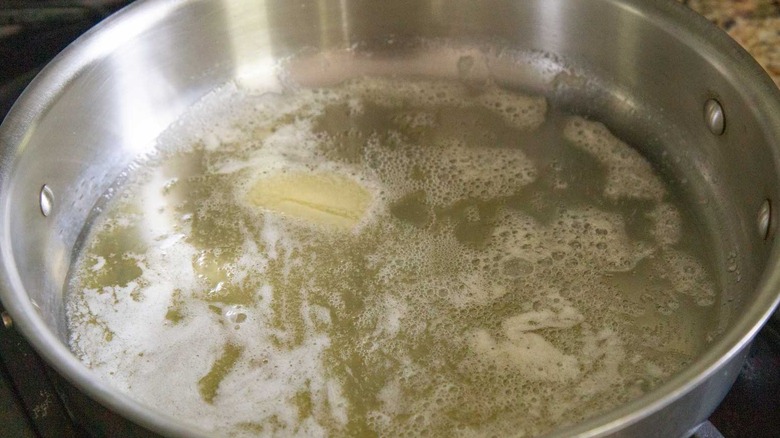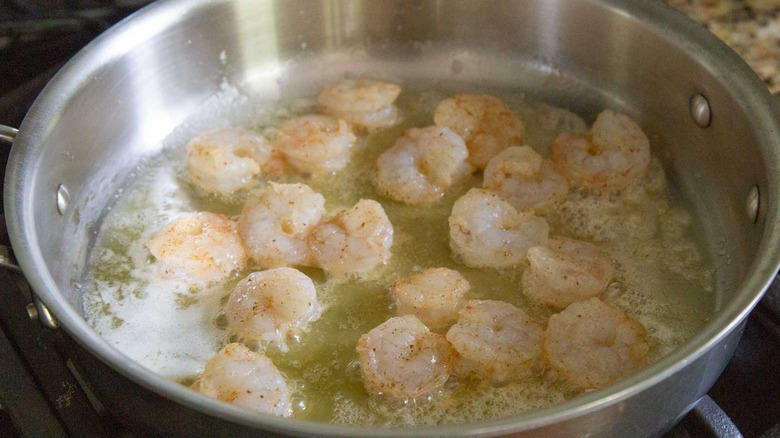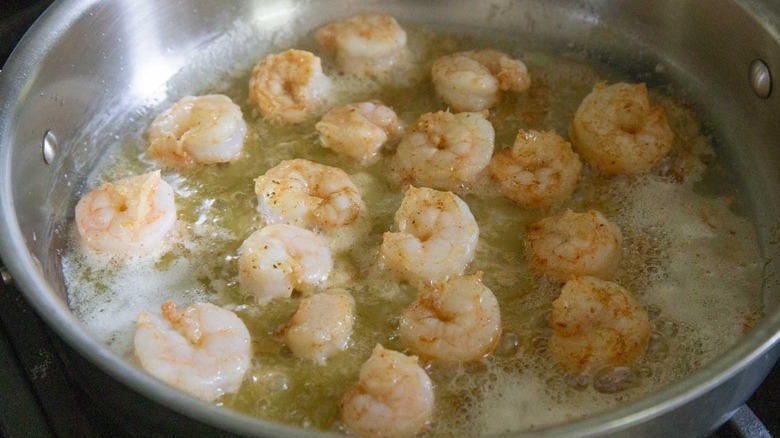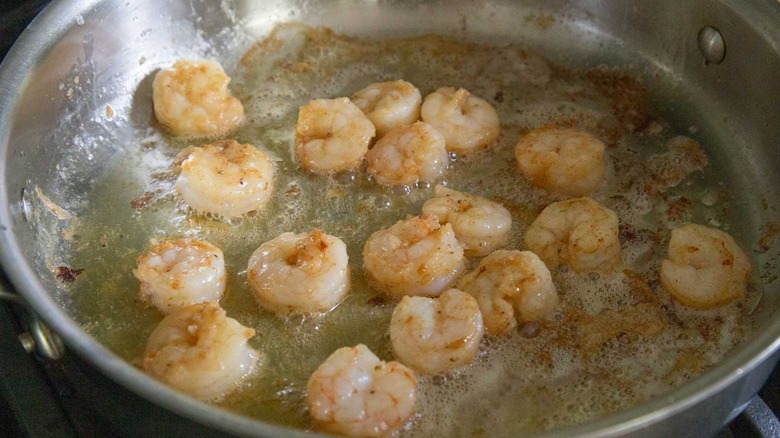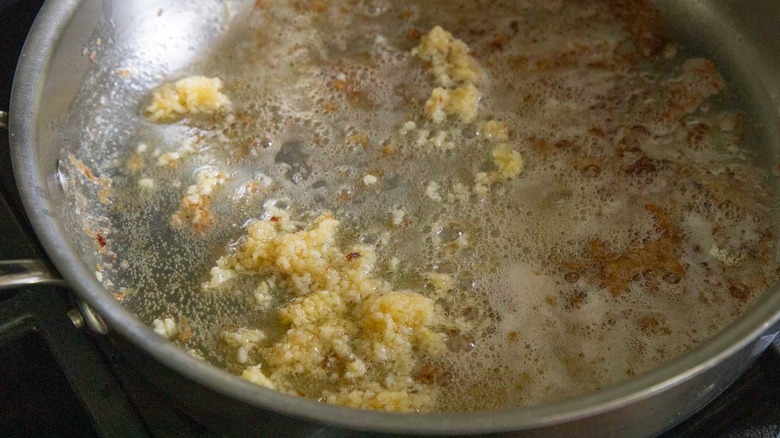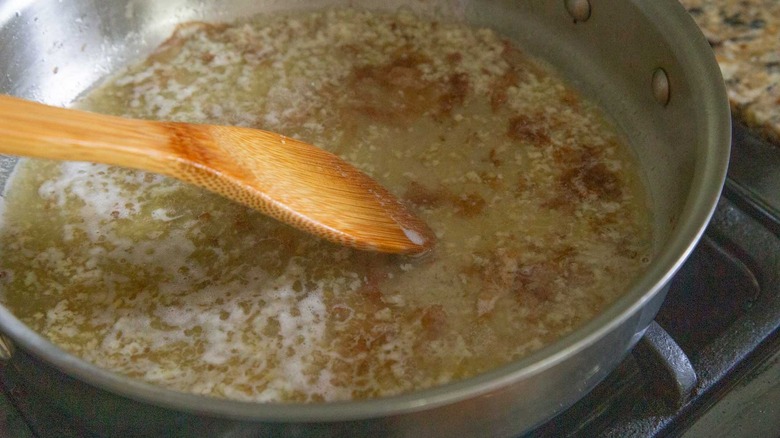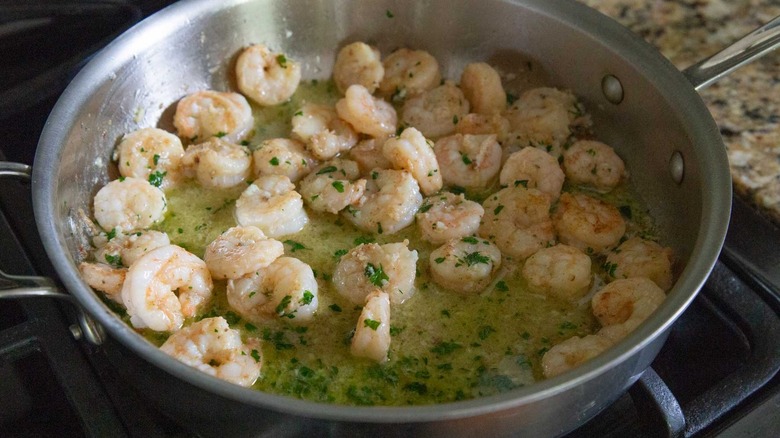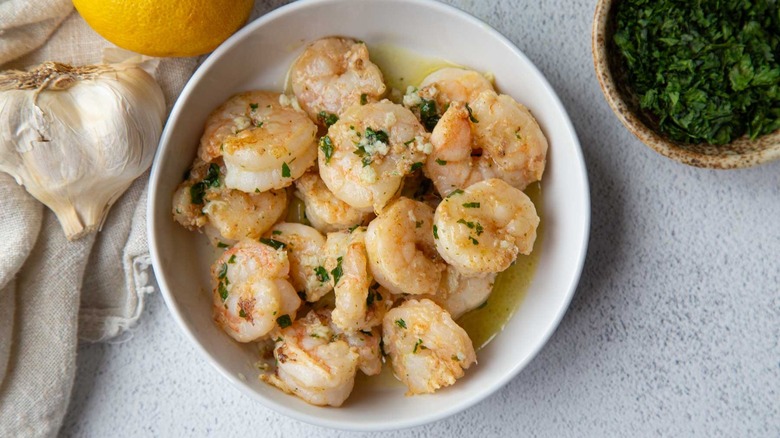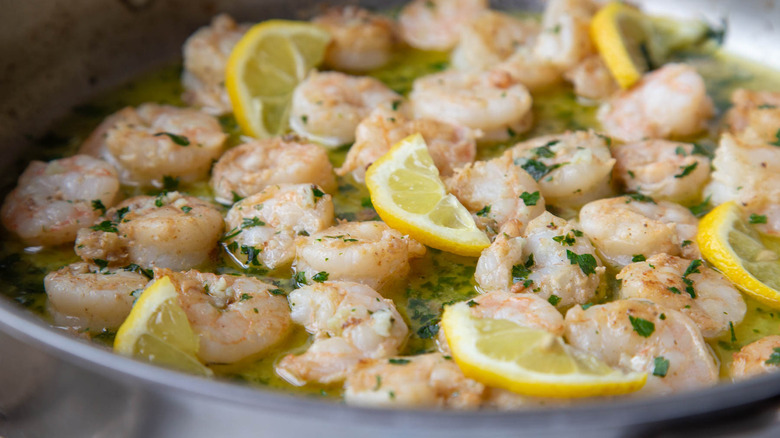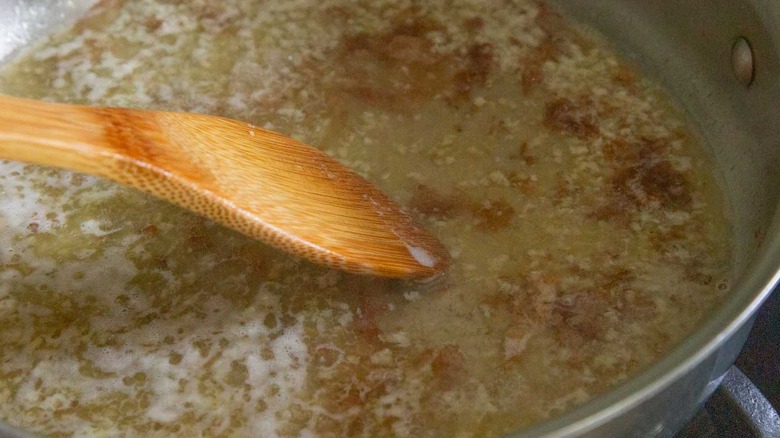Copycat Red Lobster Shrimp Scampi Recipe
We love a good 30-minute meal for when you're short on time around dinner — when time is even tighter, this copycat Red Lobster shrimp scampi clocks in at just 20 minutes. The recipe, brought to us by developer Kate Shungu, is a copycat version from the famous seafood restaurant, and it packs in all of that buttery, lemony goodness that you'd hope to find while dining out.
This recipe encompasses a simple combination of at-home cooking staples like olive oil, butter, garlic, and lemon, so there's nothing unusual to purchase at the grocery store if you don't have the ingredients already at home. And, you can use any variety of shrimp that you like for this recipe: small or large, fresh or frozen, tail-on or tail-off.
With tender shrimp and a buttery sauce, this meal tastes decadent and restaurant-worthy. Shungu recommends serving the shrimp scampi with a baguette for soaking up the sauce, or spooning the whole dish over pasta (like angel hair or classic spaghetti noodles). Or, if you'd like a Red Lobster dining experience at home, pair the scampi with copycat cheddar bay biscuits.
Gather the ingredients for copycat Red Lobster shrimp scampi
To start, you'll need a pound of raw shrimp along with salt and Old Bay for seasoning. If the shrimp is frozen, defrost it first. The sauce is made with butter, olive oil, garlic, white wine, and the juice of a fresh lemon. A sprinkle of chopped parsley at the end adds freshness and a pop of color.
Step 1: Dry the shrimp
Pat the shrimp dry with paper towels.
Step 2: Season the shrimp
Season the shrimp with Old Bay seasoning and salt on both sides.
Step 3: Heat the pan
Heat the butter and olive oil in a large skillet over medium-low heat.
Step 4: Add the shrimp
Add half of the shrimp and cook for 2 minutes.
Step 5: Continue cooking the shrimp
Flip and continue cooking for another 1–2 minutes, or until the shrimp begin to curl and turn opaque. Transfer the shrimp to a large plate.
Step 6: Repeat with the remaining shrimp
Repeat the process with the remaining shrimp and transfer them to the plate once cooked.
Step 7: Saute the garlic
Add the garlic to the skillet and saute for 30 seconds.
Step 8: Deglaze the pan
Carefully add the white wine, scraping the pan to loosen any brown bits. Let cook until reduced by half, about 4–5 minutes.
Step 9: Add the lemon juice and parsley
Stir the lemon juice and chopped parsley into the pan. Add the shrimp back to the pan and stir to coat.
Step 8: Serve the shrimp scampi
Serve warm.
How can you tell when the shrimp is done cooking?
There's a fine line between shrimp that are perfectly tender and shrimp that are tough and chewy. Knowing when the take the shrimp off the heat is key to producing perfectly cooked shrimp. Uncooked shrimp have a gentle curve to them, and look translucent. When perfectly cooked through, shrimp will be shaped like a generously curled letter "C" and be opaque, perhaps a bit pinkish in color, too. This is a little more obvious with tail-on shrimp, but if using shrimp with the tail off, just watch the shrimp as it cooks. As soon as you see it curl, take it off the heat. Overcooked shrimp will form a very tight circle like the letter "O". They will still be fine to eat, they will just be chewier.
This recipe uses large shrimp, which take about 2 minutes per side over medium heat. Small shrimp will cook more quickly than larger shrimp, so adjust your cooking time accordingly and keep in mind that shrimp do cook very quickly, so keep an eye on your pan to avoid any chewy results.
Do I have to deglaze the pan with wine?
Deglazing the pan is an excellent way to add more flavor to shrimp scampi, and save yourself some headache with cleanup. As the shrimp cook, there will be brown bits (also known as fond) that start to stick on the bottom of the pan. When a liquid ingredient is added, such as wine, and heats up, it starts to loosen the fond. You can use a wooden spoon to help this process along, scraping it from the pan. These brown bits have lots of toasty flavor, which is why we don't want to discard them and instead include them in the sauce. Not only will you be left with a more flavorful sauce, but deglazing helps scrape up brown bits that would otherwise be difficult to scrub off your pan once your in the doing dishes portion of the evening. Deglazing is a win-win!
Even if you don't have wine or don't want to include it in the recipe, you can make shrimp scampi without it. Add 1 additional tablespoon of lemon juice (for a total of 4 tablespoons), and use the lemon juice to deglaze the pan. A splash of chicken stock works well, too.
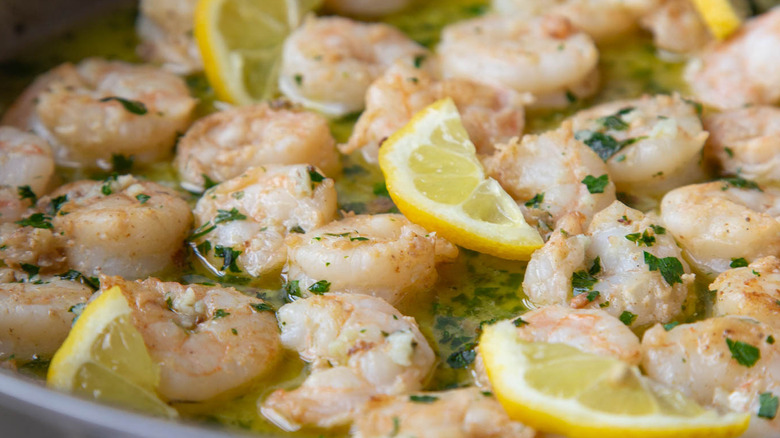
- 1 pound raw shrimp, peeled and deveined
- 1 teaspoon Old Bay seasoning
- ½ teaspoon salt
- ¼ cup butter
- 2 tablespoons olive oil
- 5 garlic cloves, minced
- ¾ cup white wine
- Juice of 1 large lemon (about 3 tablespoons)
- 1 tablespoon chopped parsley
- Pat the shrimp dry with paper towels.
- Season the shrimp with Old Bay seasoning and salt on both sides.
- Heat the butter and olive oil in a large skillet over medium-low heat.
- Add half of the shrimp and cook for 2 minutes.
- Flip and continue cooking for another 1–2 minutes, or until the shrimp begin to curl and turn opaque. Transfer the shrimp to a large plate.
- Repeat the process with the remaining shrimp and transfer them to the plate once cooked.
- Add the garlic to the skillet and saute for 30 seconds.
- Carefully add the white wine, scraping the pan to loosen any brown bits. Let cook until reduced by half, about 4–5 minutes.
- Stir the lemon juice and chopped parsley into the pan. Add the shrimp back to the pan and stir to coat.
- Serve warm.
| Calories per Serving | 303 |
| Total Fat | 18.9 g |
| Saturated Fat | 8.2 g |
| Trans Fat | 0.0 g |
| Cholesterol | 213.1 mg |
| Total Carbohydrates | 3.3 g |
| Dietary Fiber | 0.3 g |
| Total Sugars | 0.6 g |
| Sodium | 431.2 mg |
| Protein | 23.3 g |
